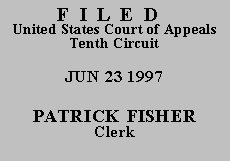

| DENNIS CARL GERMANY,
v.
ARISTEDES W. ZAVARAS, Director
of the Colorado Department of
Corrections; and GAIL NORTON |
|
Petitioner Dennis Carl Germany appeals from the district court's September 27, 1996 order adopting the findings and recommendations of the magistrate judge and dismissing his successive 28 U.S.C. § 2254 habeas petition. The magistrate judge found that all of the issues raised by petitioner in this petition have either been the subject of prior petitions or petitioner had failed to raise the claims in earlier habeas petitions. The magistrate judge further found that petitioner had demonstrated no cause for failing to raise new claims in prior proceedings and that petitioner had failed to show that failure to consider his claims would result in a miscarriage of justice. Thus, the magistrate judge, in recommending that petitioner's petition be dismissed apparently relied on the legal standards that governed analysis of habeas corpus petitions prior to the passage of the Antiterrorism and Effective Death Penalty Act of 1996 ("AEDPA") and found that petitioner's petition constituted an abuse of the writ and should be dismissed. The district court, in its order of dismissal, noted that this habeas action was initiated on April 25, 1996, but the district court also apparently relied upon applicable law prior to the effective date of the AEDPA.
The record contains an ambiguity regarding the date of filing of this petition for habeas corpus. The face of the record copy of the petition for the writ of habeas corpus shows that it was filed April 25, 1996 in the United States District Court for the District of Colorado. Assuming that filing stamp is correct, the petition was filed one day after the effective date of the AEDPA. The magistrate judge recites in his order a filing date of April 6, 1996, which is apparently in error. In the order of dismissal, the district court correctly recites the date of April 25, 1996. There is no dispute that this petition is a successive petition. Assuming that petitioner is required to comply with the relevant provisions of the AEDPA the district court in her order of November 8, 1996, applied the appropriate standards in dismissing the case and refusing to issue a certificate of appealability on the grounds that the petitioner had not made a substantial showing of the denial of a constitutional right. Under the provisions of the AEDPA, the district court had no jurisdiction to decide petitioner's successive 2254 petition without the issuance of a certificate of appealability. Even if prior law applied, the district court correctly determined that petitioner had failed to show a fundamental miscarriage of justice, and therefore that the petition was an abuse of the writ.
We construe the notice of appeal and appellate brief filed in this court as an implied application for leave to file a successive 28 U.S.C. § 2254 petition. We agree with the magistrate judge and the district court that this application for leave to file a successive petition should be denied. This court has thoroughly reviewed all of the filings in the district court and in this court and concludes that petitioner has failed to make a prima facie showing that satisfies the AEDPA criteria. 28 U.S.C. § 2244(b)(3)(C). The claims raised in the district court and on appeal do not meet either of the standards set forth in 28 U.S.C. § 2244(b)(2) as amended. Petitioner does not rely on any new rule of constitutional law or on a factual predicate that was previously undiscoverable. We therefore affirm the order of the district court dismissing petitioner's successive 28 U.S.C. § 2254 petition and affirm the order of the district court denying the certificate of appealability. Appeal DISMISSED.
ENTERED FOR THE COURT,
Deanell Reece Tacha
Circuit Judge
*.This order and judgment is not binding precedent, except under the doctrines of law of the case, res judicata, and collateral estoppel. This court generally disfavors the citation of orders and judgments; nevertheless, an order and judgment may be cited under the terms and conditions of 10th Cir. R. 36.3.